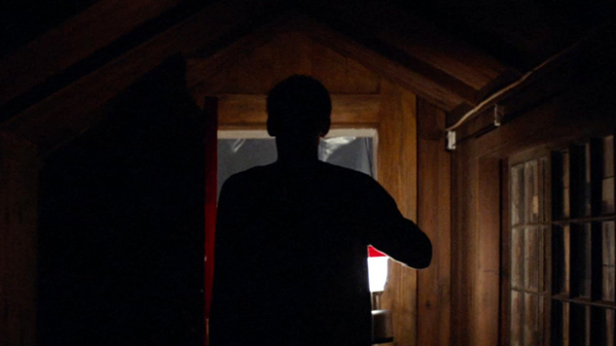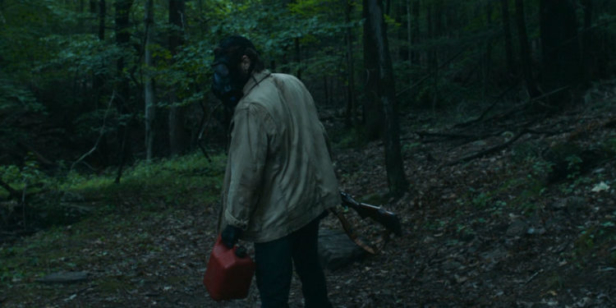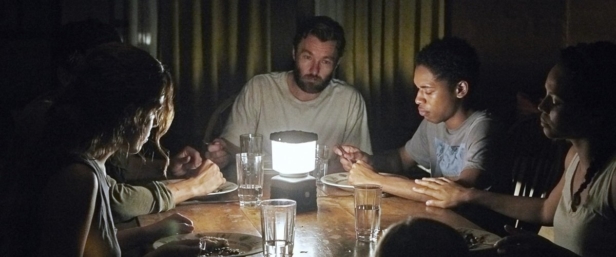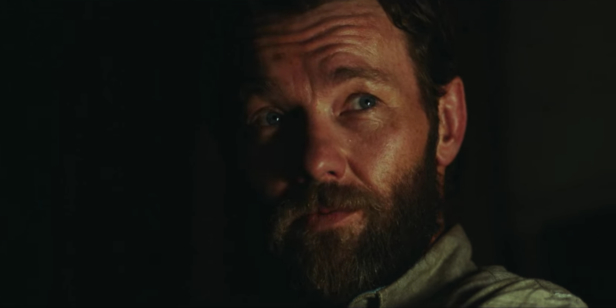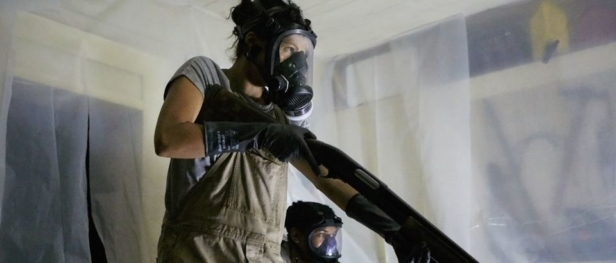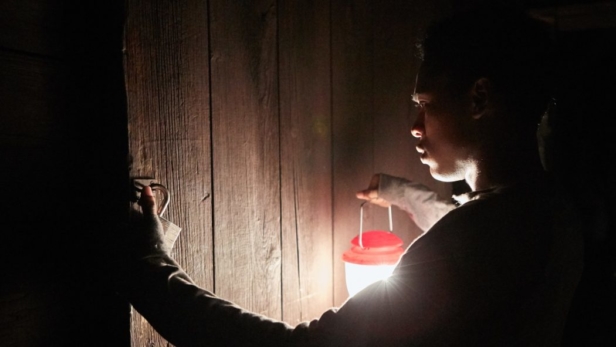It Comes At Night is an incredibly tense film. Filled with lingering glances, long shots of dark corridors, hidden truths and the constant possibility of sudden violence, it’s the kind of horror movie that takes you right to the edge of your seat, as two families sharing a house in the aftermath of some form of apocalyptic event tiptoe around the edges of trust.
You would be forgiven for thinking that the filmmaker would enjoy the experience of watching this with an audience, witnessing each jump and listening for each sharp intake of breath, but this film comes from a very personal place for writer-director Trey Edward Shults, written after the death of his father.
“I have a very weird relationship with the movie, even though it’s a fictional narrative,” he tells us. “When I watch it, it brings back my mind state of writing it, which was a very dark place, so it’s weird for me. On top of that, I worked very hard on the movie; it can be tough making a movie. It was a lovely experience but you can go a little crazy.”
It Comes At Night begins with Paul (Joel Edgerton), his wife Sarah (Carmen Ejogo) and their 17 year old son Travis (Kelvin Harrison Jr) living in a cabin in the woods, sealed off from the outside world and the viral event that has apparently decimated it. Safety measures are rigorously enforced, from the gasmasks they wear outside to the red door that must remain locked. When Will (Christopher Abbott) arrives out of the blue asking for help for his family (Riley Keough and Griffin Robert Faulkner), they decide to allow them in, setting a chain of events in motion…
Did you always have a very clear idea of the tone of the film in your mind while writing?
I think I did. But you discover even more as you embark on making it. I always saw it a sort of a haunting, melancholic film, with tension and the chamber drama of all this and everything. What I think is interesting now, on the other side of it with the movie done and doing press and intellectualising it and talking about it and trying to write something new and everything, I didn’t fully anticipate how where the movie stems from would leak over to so much of it, if that makes sense.
It’s a movie written in grief, coming from death and I feel like death in that feeling, almost like a numbness too, leaks out to so much of the movie. At least in my mind, the feeling of it. It wants more life, it wants life and it keeps getting taken away. But then the next movie I’m trying to do is full of life!
Because of where the film comes from, was it strange to then get to the point where you’re getting other people involved in the project?
Totally, but because I wrote this years ago and there’s gaps between everything, I think you get to a phase where it just becomes about the practicalities of making a movie. It’s interesting because more of the personal, almost more painful side of making the movie was more from the writing and the editing. And then the practicalities of doing it was pretty fun and pleasurable. I told everyone where it came from and stuff and we talked about what it was about, but then it was hands on, who’s this character, where does he come from, or why are we doing this camera move. You just go into it.
The characters feel very well-drawn but there’s so much that goes unspoken. To what extent were they fleshed out before the actors were cast?
It’s hard to say. It’s certainly much more written prior than Krisha, my first film, which I would say the final product was like 60% written, 40% not, so this was the opposite. This was probably 95% written or something like that. But the collaboration was the same, it would usually leak over to smaller things, like changing a beat of dialogue, or a line here, or playing with a beat in a scene. Nuances of stuff instead of inventing new scenes or inventing new character stuff.
There’s a scene between Joel Edgerton and Chris Abbott where they’re drinking whiskey. In the script phase I didn’t even have Paul talk about what he was in his past life, which is really interesting, and he basically ignored Will and just asked another question, and then Joel had the idea, he was like ‘What if we throw this in?’ And we did three different versions of the scene, it was stuff like that which was really fun to do, I love that.
The house is an amazing space, was that an actual house that you found?
It was a real incredible house and I was so happy we found it because we were scrambling and I didn’t know if we would. And actually when we first found it, we didn’t know if it was the house just because it’s so unique and it’s big, it’s really big, and we were like “Is this it?” We had to come back later in the day and we knew it was.
It’s this house in upstate New York, outside of Woodstock, it’s called The Birdcliff Colony which is like a writer’s colony retreat thing, so no one actually lives there. But the house is so old and there’s so much history that Will and Kim’s room, their side of the house were the peasant quarters of the house. And there’s real wood everywhere and I think the guy that lived in it also built it and designed it. I love that house, I’m so happy we found it.
It’s a great space for Travis to go wandering…
We do cheats, like where he’s listening in the attic at certain points don’t actually lead to those rooms and sometimes this hallway doesn’t actually lead to that, even though I didn’t want you to get the full layout in the movie, I kind of wanted it to shapeshift. I think especially with the light and stuff, and almost play it like a house that could be in your dreams. The one thing that we did do to the house was we built the red door. That was just a straight hallway that goes into a room but beside that so much of the house is as is. We just brought everyone to it.
Did having that one location help to build the tension?
Yeah, and combined with that, there’s no AC in the house, we had fans but there’s no central AC in the house, there’s boards in all the windows and just getting all our actors and crew just crammed in this house with boards on the windows and everything just added to layers of claustrophobia. Overall it was really pleasant, we had a great experience.
A lot of the tension comes from those lingering glances and characters choosing to not say things. Was that fun to explore and have the actors play with?
Definitely, I think it is so much of it is about the nuance in those moments, the unspoken and the subtext, so that’s a blast for me. It’s also fun too just to see what they do. You have the written thing and you talk about it but then see what they do.
Joel’s a fun one because he always does five different versions that all could work but in totally different ways. I’m always so excited. There are so many scenes where I have other takes that are all great, you could just subtly reshape the entire scene with these subtle inflections and everything, it’s so fun to me.
There is a lot of ambiguity and uncertainty in the film, that must be a very difficult line to walk…
Definitely. And it’s arguable if we were successful or not. To me, I’m very proud of the movie and I’m happy, it’s what I meant to make and all that, but then I’ll hear people hate the ending and hate that there’s answers not given and what are you going to do? It’s subjective but that’s art.
I think it’s a tricky line to ride. We edited this a lot longer than I edited Krisha. I took a lot of time with it, trying to get that balance just right. I don’t know if we did but I know I’m proud of it and what it is.
After we watched it we went straight to the pub and discussed different interpretations for ages!
I love that, I think it’s amazing and that’s what I wanted. The only time it bums me out is if I see something where…there were headings for a couple of reviews in the States, one was like “Great craft for an utterly pointless movie” or something, and “A depressing and pointless movie for a depressing time” and that pisses me off because I put a lot of thought and care into it and I think the movie has a lot of things on its mind and is about a lot of stuff, so I love when you go to the pub and talk about it after. Not when people are like “It’s stupid and pointless and means nothing!” But what are you going to do? [laughs]
Were there any specific influences in terms of the horror of the film?
When I was actually first writing, it wasn’t thinking about influences, it was just stemming from the personal, getting it out and spewing it out, but when studying that, I break it down to three horror movies for the horror aspect. For me it was The Shining, The Thing and Night Of The Living Dead. All influencing in their different ways, but then that combined with family drama and other stuff to where the movie is where it is.
I love The Fly, I love Don’t Look Now, I love Rosemary’s Baby, but those three in particular, I think it’s the threat and what it does to the people. Whether it’s the zombies outside of the house or the monster shape-shifting into these people or the ghost at the hotel, it’s how it changes the relationships with the people and that was really fascinating to me.
Would you be interested in making another horror film?
I’m certainly not doing a horror movie next but I love horror movies and I would be happy to do another horror movie at some point, it would just need to be different from this movie. I just don’t want to do the same stuff, so the next thing I’m trying to write is kids in high school and a family over a year so totally different, but I think emotionally there’s connections. So who knows, we’ll see!
It Comes At Night is released on 7 July. Keep up with the latest horror news with the new issue of SciFiNow.
